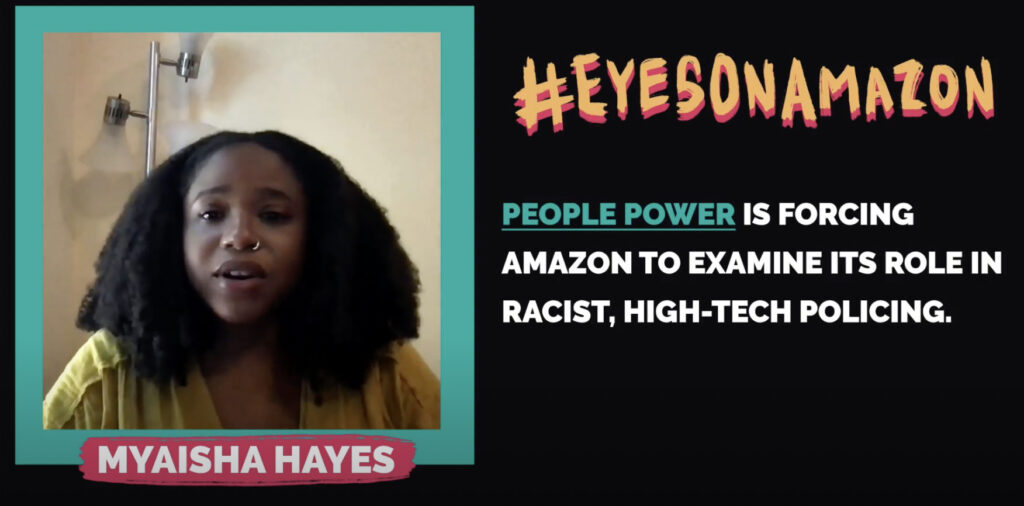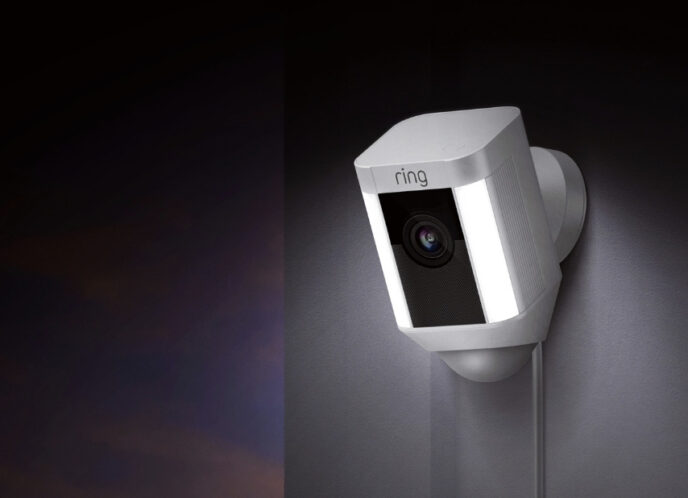At the end of our #EyesOnAmazon Week of Action—let’s take a look at how we got here and some highlights from the week.
SETTING THE SCENE: SUMMER 2020
Last summer after the murder of George Floyd, the uprisings prompted Amazon and other large corporations to release performative “solidarity” statements to Black communities, including its empty promise to pause selling its racist facial recognition and surveillance technologies to law enforcement for one year, until June 10, 2021.
Amazon hoped we would forget about this promise a year later, but we could never forget the way it devastates our communities every day—its entire business model is racist, exploitative, and threatens our safety. From tracking its workers’ every move and creating dangerous working conditions to leveraging its obscene wealth to pressure Congress in whatever way best benefits their bottom line, Amazon has privately continued to expand its surveillance empire while publicly claiming “Black Lives Matter.”
ANNIVERSARY LEAD UP: MAY 2021
As we counted down to the 1 year anniversary of Amazon’s empty announcement about its moratorium we launched the #EyesOnAmazon campaign in partnership with the Athena Coalition to keep the pressure on Amazon to permanently divest from facial recognition technology and partnerships with police.
After years of fighting and one week after we put Amazon’s Jeff Bezos and Andy Jassy on notice in an #EyesOnAmazon open letter, supported by over 50 organizations across the Athena Coalition, we earned an important victory.
Amazon announced it would extend its moratorium. However, “until further notice” isn’t the same as a total ban. Amazon didn’t come to this decision on its own. It took years of organizing led by Black and brown activists that made this victory possible and we weren’t going to let up.
We headed to the doors of Amazon’s biggest shareholders for a Day of Action to elevate our demands ahead of its Annual Shareholder Meeting and we pushed ahead with our Week of Action as scheduled to make it abundantly clear: we want to live in a world without policing and surveillance.
WEEK OF ACTION RECAP: JUNE 7-11, 2021
In case you missed it, here are highlights from the week of virtual events calling on Amazon to permanently ban facial recognition and end surveillance partnerships with law enforcement agencies. Check out recordings from the events on our YouTube playlist.
MONDAY JUNE 7: #CopsAndRobberBarons
Monday’s actions showed us that whenever we talk about Big Tech’s concentration of wealth, we need to zoom out beyond wonky policy debates about antitrust laws. We need cultural strategies to fight back against the “Gospel of Wealth ” and other things that colonial capitalism has justified and normalized, especially the violent nature of exploiting Black and brown people for profit at home and resourcing wars against other marginalized communities abroad. Here’s what happened:
“Fighting Corporate Power and Racism” Instagram Live
Myaisha Hayes, Campaign Strategies Director at MediaJustice and Vasudha Desikan, Political Director at Action Center on Race and the Economy (ACRE) went live to break down how corporate power and racism are intrinsically linked.
- Myaisha Hayes (MediaJustice): “All Amazon did was find ways to monetize exploitation at scale—it’s not new. There’s a God Complex in Silicon Valley that’s similar to Carnegie’s “The Gospel of Wealth.” ‘We’re white men who have done such great things for the world, it’s our duty and our right to profit as much as we would like because we’re “innovators.’”
- Vasudha Desikan (ACRE) : “The Big Tech monopoly space is complicated because of the co-opting of #BreakUpBigTech. Some people like Josh Hawley, Marco Rubio, Ted Cruz, Tucker Carlson, QAnon, claim to be allies. They say break up big tech too but we have no common cause with fascists and white nationalists whose big fight is making sure white conservative voices aren’t “silenced.” We’re not in the same fight as them so it’s that much more important to name that these big corporations make their money off communities of color and profiteer from structural racism.”
“Big Tech and the War on Terror” #AmazonSellsWar Twitter Chat
- MPower Change and Action Center on Race and the Economy (ACRE) anchored a discussion that mapped out how Amazon built its surveillance empire off of anti-Black policing and U.S. imperialism while profiting from the criminalization and mass surveillance of our communities. We broke down our movement’s solidarity with Palestine, how the “War on Terror” has increased police budgets, and more.
TUESDAY JUNE 8: #PolicingWorkers
Tuesday, we learned how Amazon’s policing of its workers is rooted in the same ethos as slavery with workers pointing out that, Amazon doesn’t call its warehouses “fulfillment centers” like Macy’s and other large retailers, it uses “picking, like cotton.” What’s worse, the company pitches itself as inclusive but in reality, those on the floor are Black and brown but as far as the management, “the higher you go, the paler it gets.” Providing (and then slashing) benefits like bonuses and Amazon TVs isn’t the same as ensuring workers have safety and dignity on the job.
“Worker Surveillance at Amazon” Panel
Moderated by Ryan Gerety (Athena), a panel featuring sisters who work at Amazon, Allegra and Courtenay Brown, remarks from Gabrielle Rejouis (Color of Change) and research from David Rosenblatt (Strategic Organizing Center) discussed how Amazon’s brutal worker surveillance encourages and enforces a degrading and dangerous pace of work.
- Courtenay Brown (Amazon): “After 4 years on the job getting pushed to go faster and faster every day, I have plantar fasciitis and tendonitis so I’m in constant pain all day, every day. Sometimes after a long shift at Amazon, I wonder if I’ll have to crawl to the bathroom when I get home because it’s too painful to walk.”
- Allegra Brown (Amazon): “They view us as slaves, the same as how we were viewed back then. Amazon just tries to twist it and tweak and make it seem like it’s not as bad as it is. They try to justify or hide what they’re doing by throwing a bonus in our face.”
- Gabrielle Rejouis (Color of Change): “When we talk about the historical surveillance of workers, three examples come to mind: enslaved Africans, the American factories, and the surveillance of the United Farm Workers. These are neither new struggles or techniques. While the tools have evolved, the spirit behind surveillance has not.”
WEDNESDAY JUNE 8 RECAP: #PoliceOnThePorch
Wednesday we explored just how insidious Amazon’s tactics are, exploiting our people for enormous profits then using that wealth to influence lawmakers, arm police with the tools they need to create a surveillance state, and then funding PR campaigns to do damage control and spin its harms. Panelists pointed out that there is a very big—and duplicitous— difference between what Amazon says in public and what it does behind closed doors.
“Amazon and Big Tech’s Chokehold on Democracy” Panel
Moderated by Sandy Fulton (Free Press), panelists Jennifer Lee (ACLU-WA), Jane Chung (Public Citizen), Hayley Tsukayama (Electronic Frontier Foundation), Alex Kantrowitz (Big Technology newsletter) exposed how Amazon— the second largest corporate lobbying spender in the country— has used its enormous fortune to influence lawmakers, squeeze out competition, and shape our democracy.
- Jennifer Lee (ACLU-WA): “These Big Tech companies oftentimes characterize themselves as privacy champions or experts while they oppose legislative efforts that are supported by the groups that are working to protect people from privacy harms. This kind of duplicitous messaging is really harmful…when the outsize voice in the room is Big Tech and not the people bearing the brunt of the harm, that leads to policies that don’t actually help people. Big Tech shouldn’t be the most valued voice in the room.”
- Jane Chung (Public Citizen): “Recently Amazon blitzed airwaves, newspapers, and social media with ads supporting raising the federal minimum wage to $15/hour. Why does Amazon care about $15/hour minimum wages when they’re pretty notorious for abusing their workers? When you look behind the curtain, you’ll see that while Amazon changed their wages to $15/hour, they cut a ton of employee benefits and incentives so that the net result actually wasn’t better for employees. The real goal for Amazon is to repaint their image as a ‘respectful employer.’”
- Hayley Tsukayama (Electronic Frontier Foundation): “These tech companies no longer have the kind of ‘untouchable, shimmering engine of American innovation’ reputation they once did… The fact that we’re getting [Big Tech] in the room to testify is itself a type of win, even if we have work to do.”
- Alex Kantrowitz (Big Technology newsletter): “There’s something going on with the testimony given in front of Congress, where there are “independent” companies very willing to make the tech giants’ case almost in the exact words that the tech giants would use…Under the law this isn’t illegal, but it’s what I call ‘soft corruption.’ Something that we say is okay according to the law but it’s really underhanded tactics that are influencing the way policy discussions are going.”
- RECAP: Watch it on Athena’s Facebook
THURSDAY, JUNE 10: #ProtestAmazon
Thursday marked the official 1 year anniversary of Amazon’s empty promises in support of Black lives and moratorium on selling their facial recognition tool to police and federal agencies. Activists showed up across the country—from virtual protests to in person actions, with a particular focus on how Amazon is the digital backbone of police agencies that target Black and immigrant communities.
“DHS and Amazon Building Biometrics Database” Panel
Moderator Ryan Gerety (Athena) set the scene in a dystopian future where biometric information from across Amazon’s surveillance empire is connected and fed into a single system that all government agencies can access easily: HART, the Homeland Advanced Recognition Technology. This proposed $4.3 billion dollar biometrics database (hosted on Amazon Web Services and used by DHS) would be used to track and identify millions of immigrants and US citizens in real time. Panelists Jacinta Gonzales (Mijente), Paromita Shah (Just Futures Law), and Mizue Aizeki (Immigrant Defense Project) discussed what’s at stake and what we can do to stop HART from being implemented.
- Ryan Gerety (Athena): “Amazon’s stance of ‘we’re just providing a [hosting] service’ hides a dangerous reality, which is that Amazon Web Services enable a level of cheap and scalable computing. What does it change that Amazon offers itself to DHS cheaply?”
- Jacinta Gonzales (Mijente): “Who are the companies giving immigration the information to be able to conduct these raids on [immigrant communities]? Data brokers, like Reuters, had millions of dollars of contracts with ICE and were giving them our utility bills, our DMV records, our medical bills. ICE also needed someone to analyze all of that information, so in came companies like Palantir, who had been working with the military and the CIA for years. And you know who was helping them store that information? Amazon”
- Paromita Shah (Just Futures Law): “Having Amazon as a backbone for so much of DHS’ operations allows DHS to hide behind Amazon and claim they’re doing things efficiently and allows Amazon to blame DHS for its failures and they kind of trade accountability. It’s a twisted system”
- Mizue Aizeki (Immigrant Defense Project): “HART would take DHS’ surveillance capabilities to a pretty dystopian and scary level. It would not only increase the number of biometrics that are in the database—including palm prints, scars, tattoos, voice prints, even DNA—it’s also going to bring a lot more processing power and analytic capability [than IDENT, the current system].”
- RECAP: Watch it on Athena’s Facebook
#EyesOnAmazon Petition Delivery
- To close out the Week of Action, we delivered 10K petitions to Andrew Jassy and Jeff Bezos to #ProtestAmazon and put them on notice—we’ll have #EyesOnAmazon until it permanently bans surveillance tech, ends contracts with police, and ensures workers are safe and respected. We here at MediaJustice launched a video to break down what’s at stake and why we can’t let up until all of our demands are met.





